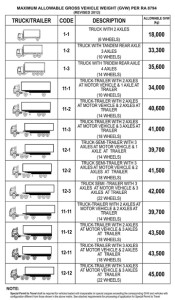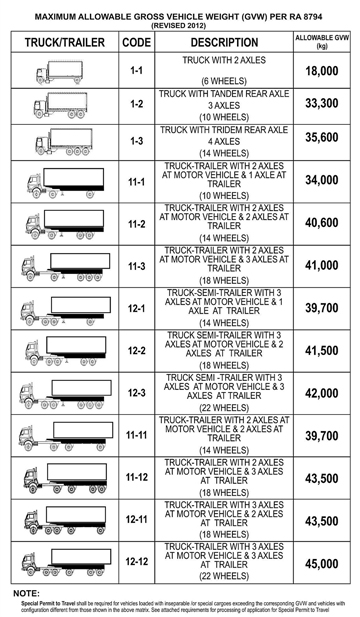 Philippine cargo truck operators are seeking suspension of an amended anti-overloading policy implemented starting June 1.
Philippine cargo truck operators are seeking suspension of an amended anti-overloading policy implemented starting June 1.
A resolution amending the implementing rules and regulations of Republic Act 8794, also known as “An Act Imposing a Motor Vehicle User’s Charge on Owners of All Types of Motor Vehicles and for Other Purposes,” was approved jointly on April 5 by Transportation and Communications Secretary Joseph Abaya and Public Works and Highways Secretary Rogelio Singson. The law was originally signed on June 27, 2000.
The amended resolution provides for penalties of an amount equivalent to 25% of the motor vehicle user’s charge for a truck or trailer loading beyond its prescribed gross vehicle weight, provided that no axle load shall exceed 13,500 kilograms. The Department of Transportation and Communications, through the Land and Transportation Office, is responsible for imposing the penalties.
Truckers reacted angrily to the revised regulations, saying they provide an overloading tolerance percentage of as much as 31% for truck configurations not commonly used in the Philippines, compared with the 2% allowance given to truck categories that are.
“The trucking industry is not happy with the re-evaluation of the gross vehicle weight (GVW),” Ruperto Bayocot, chairman of the Confederation of Truckers Association of the Philippines (CTAP), told PortCalls in a text message from California, where he is on a visit.
“Even if most of our request for tolerance of 5% to 20% was granted, the evaluation committee gave more premium/capacity to (truck) configurations not commonly used in the Philippines,” he said.
Under the new law, 22-wheeler trucks (Code 12-3), the most commonly used in the country, were given an overloading tolerance percentage of just 2% of the GVW of 42,000 kg. On the other hand, 14-wheeler trucks (Code 11-11) and 18-wheelers (Code 11-12), models not available in the Philippines, were given 30.69% (GVW of 34,000 kg) and 17.89% (GVW of 40,600 kg), respectively.
Bayocot said that during a meeting with stakeholders on March 28, 2012, Singson “verbally agreed” that the GVW for Code 12-3 trucks should be 49,000 kg. The final rules placed the GVW for that configuration at only 42,000 kg; the original was set at 41,000 kg.
Integrated North Harbor Truckers Association (INHTA) chairman Teodorico Gervacio told PortCalls in a phone interview his group is requesting the Department of Public Works and Highways (DPWH) to suspend execution of the policy on allowable GVW on trucks, and wants a meeting with both DPWH and DOTC.
He echoed Bayocot’s comment that the truck configurations widely considered by the two agencies are not generally used in the Philippines.
Small capacity
In addition, Gervacio pointed out the prescribed GVW for the commonly used code 12-3 truck (42,000 kg) is less than each vessel’s average total load when carrying a 40-footer.
He explained that a code 12-3 truck has a tail weight of at least 13,500 kg and if it carries a 40-foot container which weighs on average 30,000 kg, that would bring the total weight to 43,500 kg — 1,500 kg more than the 42,000 kg prescribed.
This was also the sentiment of Bayocot who said truckers won’t be able to carry much if the weight restrictions are strictly implemented. He noted the situation could be an opportunity for much corruption among enforcement agents.
Gervacio said INHTA members are already feeling the effects of the amended rules, with some of their vehicles having been apprehended for overloading.
If the crackdown continues, he said truckers could stop taking orders to carry containers. So far, he said, the group hasn’t received any feedback from the DOTC and DPWH.
The amended IRR allows a special permit to travel issued by DPWH for vehicles loaded with inseparable or special cargoes or vehicles with different configurations that exceed the prescribed GVW.
The anti-overloading policy was put in place to protect the country’s roadways from damage. Weighbridge stations and portable weighing machines have been installed by DPWH at strategic points along national roads 24 hours a day, including on weekends and holidays.





